This is a great opportunity to hear Dr. Lance Strate and Dr. Thom Gencarelli discuss the relevance of media. These two esteemed academics delve into the impact of technologies such as oral and written word, press, radio, television, internet, and even artificial intelligence in this video. Why is Media Ecology also important? What relationship does it have with General Semantics? If you’re interested in these topics, I invite you to watch the video.
MIL Cities and ESG Principles
Comparto, la presentación que utilicé en el WEBINAR que organizaron el Dr. Felipe Chibás Ortiz, International Co-líder del Grupo de Innovación de UNESCO MIL Alliance y el Dr. Emmanuel Komi Kounakou, Director de PAFEME, Líder de la Iniciativa MILCities initiative para Canada y Africa.
Participantes:
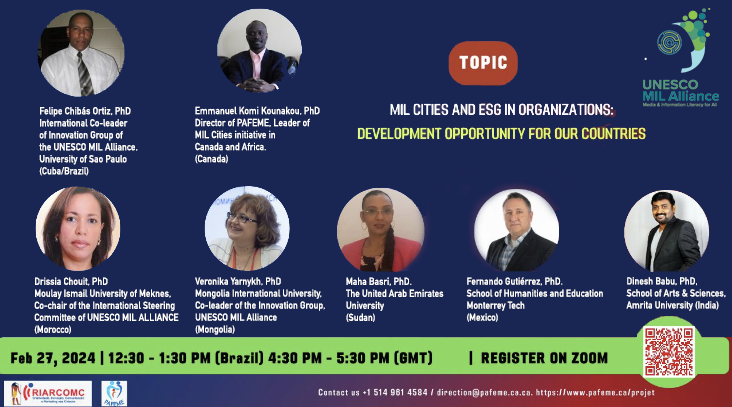
Aquí los datos del Webinar:
Key Details:
Language: English
Date: Tuesday, February 27, 2024
Time: 12:30 PM to 01:30 PM Brazilian Time / 4:30 PM to 5:30 PM GMT
Co-Moderators: Dr. Felipe Chibás Ortiz, Associate Professor at the Latin American Integration Program,
University of São Paulo. International Co-leader of the Innovation Group, UNESCO MIL Alliance
Dr. Emmanuel Komi Kounakou, Director of PAFEME, Leader of MIL Cities initiative in Canada and Africa.
Presentación:
Desentrañanado la revolución de la inteligencia artificial en el campo de la comunicación.
Comparto parte del material que utilice en la conferencia inaugural del Coloquio Inteligencia artificial, presente y futuro, que organizó la Maestría en Comunicación y Política, en el marco de los eventos del 50 Aniversario de la Universidad Autónoma Metropolitana (UAM). El tuvo lugar el 29 de noviembre, en las instalaciones de la UAM Xochimilco.
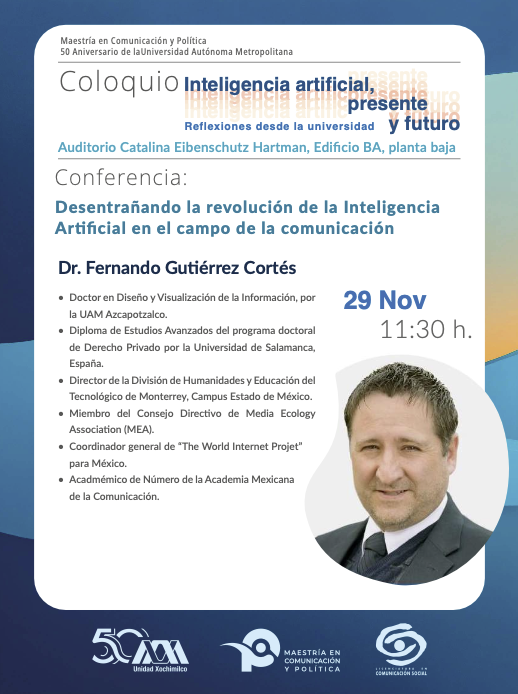
El título de la conferencia fue Desentrañanado la revolución de la inteligencia artificial en el campo de la comunicación.
Tecnología educativa de última generación para el enriquecimiento del proceso de aprendizaje
Comparto parte del material que trabajé durante mi estancia en la universidad de Cartagena donde dicté la conferencia titulada: “Tecnología educativa de última generación para el enriquecimiento del proceso de aprendizaje”.
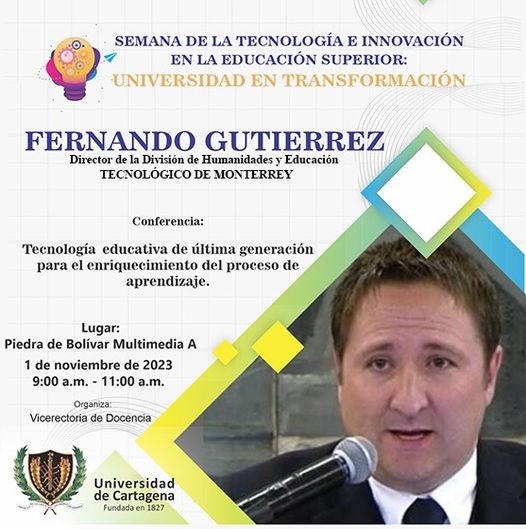
Aquí parte del contenido que revisamos en el evento: Tecnología educativa de última generación para el enriquecimiento del proceso de aprendizaje. Cartagena, Colombia. Del 1 al 4 de noviembre de 2023
Exploring the Limits of Artificial Intelligence in the Artistic Domain
Some months ago, nobody was talking about artificial intelligence, but now things are different. Many magazines have designated 2023 as the year of artificial intelligence. Anyway, the challenges we are witnessing today with the introduction of artificial intelligence are not very different from what we saw several years ago with the advent of the Internet and computers, and other devices. Artificial intelligence is being used to perform various tasks that can undoubtedly bring great benefits to different fields. However, this intriguing technology still has limitations when it comes to its capacity. Artificial intelligence still lacks the competence that some human beings possess to understand and reflect the meaning and cultural context of their creations or productions. Humans can think abstractly and find innovative solutions that go beyond the limits of available data.
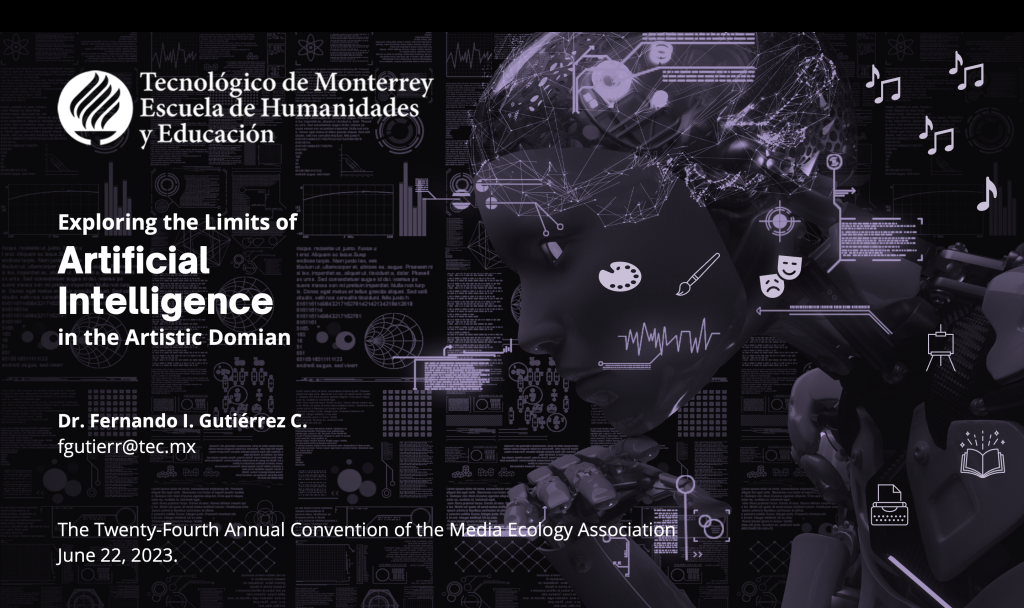
This was part of my presentation at the 24th Annual Convention of the Media Ecology Association which took place at Fordham University, in New York City.
An AI language model can assist in the artistic field in several ways. Here are some things an AI model can do (OpenAI, 2023):
- Generate poetry and song lyrics: AI can compose poems in different styles and themes, as well as assist in writing song lyrics.
- Aid in creative writing: AI can provide ideas, suggestions, and help develop plots, characters, and dialogues for plays, novels, short stories, scripts, and more.
- Create visual descriptions: AI can help paint detailed and vivid mental images by describing landscapes, scenes, or any other visual elements.
- Design artistic or band names: If you need a creative stage name for yourself or your band, AI can assist in generating original and appealing ideas.
- Provide artistic information and knowledge: AI can answer questions related to artists, artistic movements, styles, famous artworks, music, and more.
Sobre el día mundial de Internet (2023)
Derechos personales, violencia y otras conductas en internet
El seminario titulado “Derechos personales, violencia y otras conductas en internet”, tuvo lugar los días: miércoles 3 y jueves 4 de mayo, en el Aula Magna de la Universidad Panamericana, campus Mixcoac.
Mi participación fue en la mesa 6 (jueves 4 de mayo) hablando sobre el tema de los discursos de odio en Internet (Tiempo: 02:12:00)
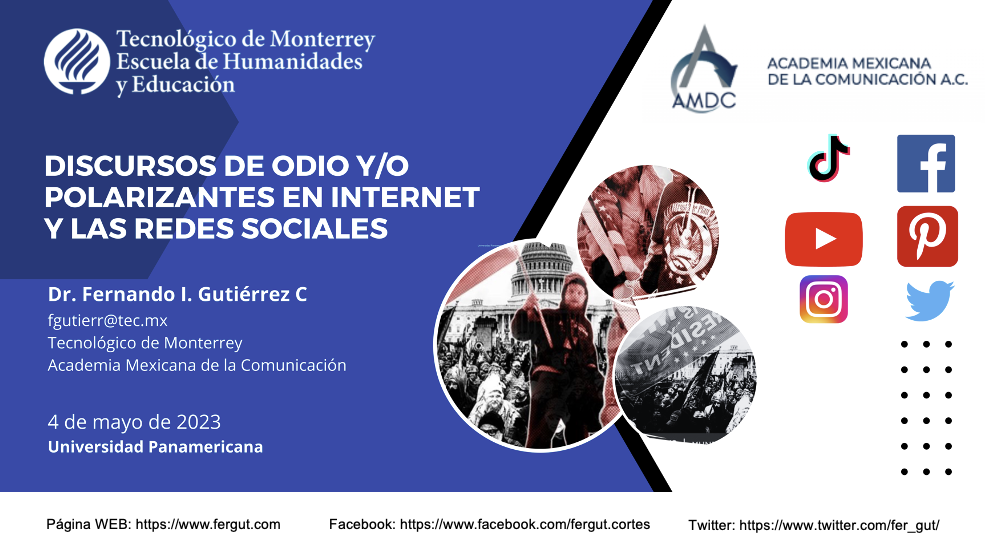
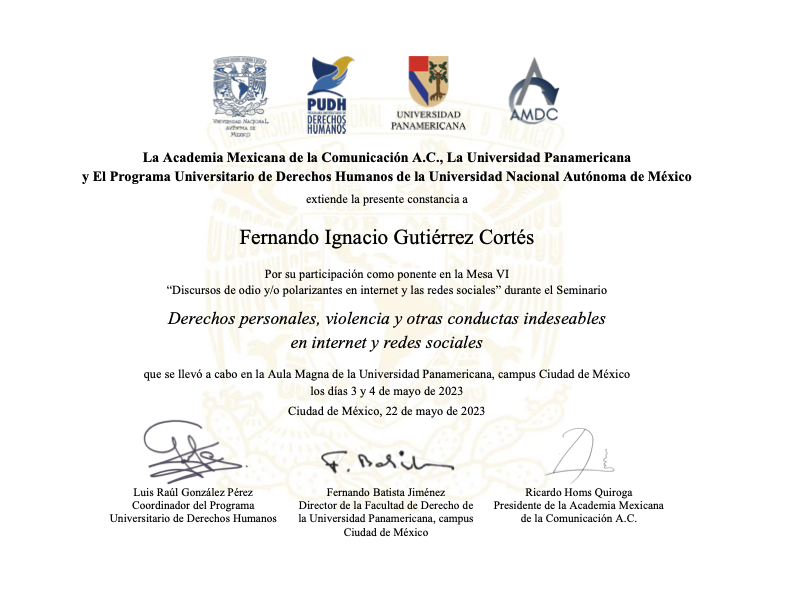
Explorando los límites de la inteligencia artificial en el campo de la comunicación
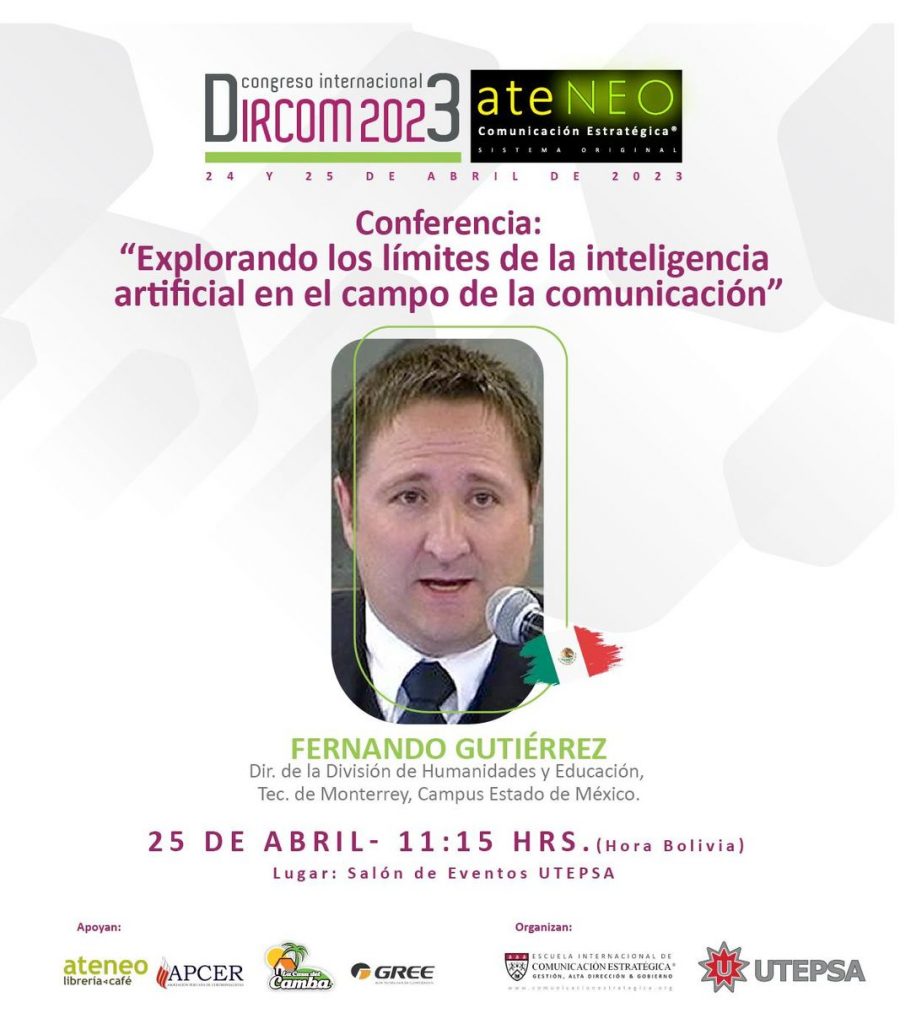
Conocer más de la 𝐢𝐧𝐭𝐞𝐥𝐢𝐠𝐞𝐧𝐜𝐢𝐚 𝐚𝐫𝐭𝐢𝐟𝐢𝐜𝐢𝐚𝐥 𝐞𝐧 𝐞𝐥 𝐜𝐚𝐦𝐩𝐨 𝐝𝐞 𝐥𝐚 𝐜𝐨𝐦𝐮𝐧𝐢𝐜𝐚𝐜𝐢𝐨́𝐧 𝐲 𝐥𝐨 𝐪𝐮𝐞 𝐧𝐨𝐬 𝐝𝐞𝐩𝐚𝐫𝐚 𝐞𝐥 𝐟𝐮𝐭𝐮𝐫𝐨, es parte de la conferencia de 𝐅𝐞𝐫𝐧𝐚𝐧𝐝𝐨 𝐆𝐮𝐭𝐢𝐞́𝐫𝐫𝐞𝐳, 𝐃𝐢𝐫𝐞𝐜𝐭𝐨𝐫 𝐝𝐞 𝐥𝐚 𝐃𝐢𝐯𝐢𝐬𝐢𝐨́𝐧 𝐝𝐞 𝐇𝐮𝐦𝐚𝐧𝐢𝐝𝐚𝐝𝐞𝐬 𝐲 𝐄𝐝𝐮𝐜𝐚𝐜𝐢𝐨́𝐧 𝐝𝐞𝐥 𝐓𝐞𝐜𝐧𝐨𝐥𝐨́𝐠𝐢𝐜𝐨 𝐝𝐞 𝐌𝐨𝐧𝐭𝐞𝐫𝐫𝐞𝐲, 𝐂𝐚𝐦𝐩𝐮𝐬 𝐄𝐬𝐭𝐚𝐝𝐨 𝐝𝐞 𝐌𝐞́𝐱𝐢𝐜𝐨; 𝐌𝐢𝐞𝐦𝐛𝐫𝐨 𝐝𝐞𝐥 𝐂𝐨𝐧𝐬𝐞𝐣𝐨 𝐃𝐢𝐫𝐞𝐜𝐭𝐢𝐯𝐨 𝐝𝐞 𝐥𝐚 𝐌𝐞𝐝𝐢𝐚 𝐄𝐜𝐨𝐥𝐨𝐠𝐲 𝐀𝐬𝐬𝐨𝐜𝐢𝐚𝐭𝐢𝐨𝐧 (𝐌𝐄𝐀); 𝐲 𝐂𝐨𝐨𝐫𝐝𝐢𝐧𝐚𝐝𝐨𝐫 𝐆𝐞𝐧𝐞𝐫𝐚𝐥 𝐝𝐞 ❞𝐓𝐡𝐞 𝐖𝐨𝐫𝐥𝐝 𝐈𝐧𝐭𝐞𝐫𝐧𝐞𝐭 𝐏𝐫𝐨𝐣𝐞𝐜𝐭❞ 𝐩𝐚𝐫𝐚 𝐌𝐞́𝐱𝐢𝐜𝐨.
Para conocer el programa e inscribirte al mismo, ingresa en el link: www.utepsa.edu/Dircom
Los interesados en participar fuera de Bolivia, pueden asistir mediante virtualidad en la plataforma zoom, a través de un pago vía depósito, como se especifica en la página web indicada o través de Western Union, consultando sobre esta modalidad al correo: jefe.carrera.comunicacion@utepsa.edu
Democracy and Media Ecology
The New York Society for General Semantics is proud to present a special event titled “Democracy and Media Ecology” at the historic Players at 16 Gramercy Park South in New York City. Our event will take place on Friday evening, January 27th between 6pm and 9pm, and we hope you’ll register and join us for what promises to be a lively and engaging discussion.
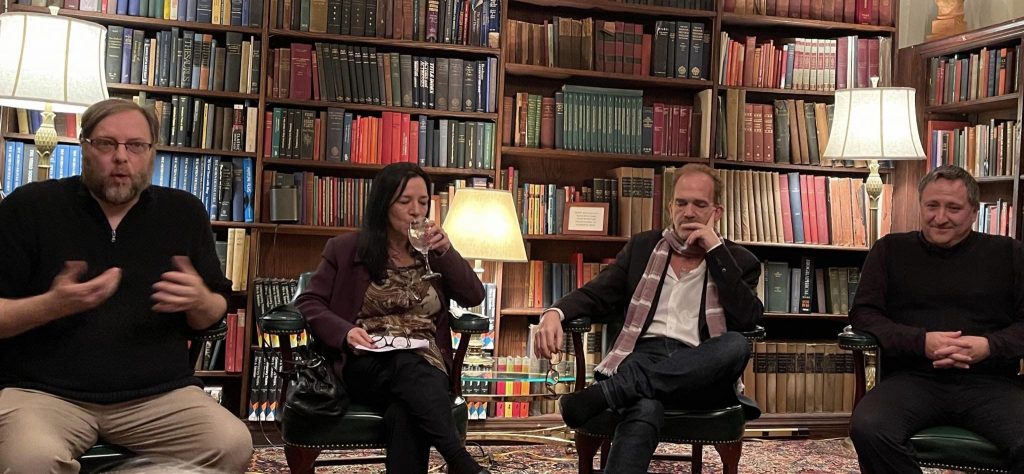
Date: 27 Jan 2023
Time: 6:00 PM – 9:00 PM
Location: The Players NYC – 16 Gramercy Park South, NY, NY
Media ecology entails the study of media as environments. Those things that go between us and what’s “out there” strongly influence the way we think, act, and communicate. Neil Postman famously called media ecology “general semantics writ large.” As our good friend Thom Gencarelli wrote in 2020, reviewing Postman’s role in both fields, “If general semantics considers our semantic environment, or context in which utterances take place, and the fact that the sense and sensibility and result of such utterances are to a great extent determined by that context, then the same holds true when we expand the concept of our semantic environment to consider our various media environments – wherein the nature of the medium, as a context, influences both the nature of utterances offered and the meanings we make from such utterances.”
This point is particularly valuable in attempting to understand how we shape our world through the choices we make in organizing and governing our affairs. Democracy is one system, method, or medium for engaging in that important work and therefore it’s important to consider the democratic shape of things as we seek to improve and progress as human beings. As democratic systems of various types become strained by the pace and intensity of our contemporary condition, we gather to consider what’s going on and what we might do about it.
Each January, the Executive Board of the Media Ecology Association holds its annual meeting in New York City, and the NYSGS is very pleased to have a number of principals of the MEA Board with us to share food, drink, and an evening of intellectual reflection.
Dr. Adriana Braga is Immediate Past President of the MEA and Associate Professor at the Social Communication Department at the Pontifícia Universidade Católica/Rio de Janeiro (PUC-Rio), Coordinator of the Digital Media Lab and researcher of the National Council for Scientific and Technological Development (CNPq, Brazil).
Dr. Thom Gencarelli is a Past President of the MEA, Treasurer of the NYSGS, and Editor-in-Chief of the Institute of General Semantics’ journal ETC: A Review of General Semantics. He is Professor and founding Chair of the Communication Department at Manhattan College.
Dr. Fernando Gutiérrez is the long time Executive Secretary of the MEA and the head of the Division of Humanities and Education at the Monterrey Institute of Technology and Higher Education (State of Mexico Campus). Dr. Gutiérrez is an author of several titles about media and information technologies; and part of the National System of Researchers in Mexico. His interest focuses on the exploration of different media environments.
Moderating the evening’s discussion is Dr. Michael Plugh, President of the MEA and the NYSGS. Dr. Plugh is Associate Professor in the Communication Department at Manhattan College.
We hope you’ll drop in to join us. Registration is free, but all attendees must be registered in order to gain admittance to the club. This includes any guests you might want to bring with you.
The program will take place in the Library on the 2nd floor of the club. Please note that, as an historic 19th century landmark, the site is not handicap accessible. Dress code is business casual and is strictly enforced, including no sneakers, shorts, ripped jeans, t-shirts).
Redes Sociales y Ciudadanía
Comparto la liga al al libro colectivo que editó Grupo Comunicar, bajo el liderazgo del Dr. Ignacio Aguaded, Arantxa Vizcaíno-Verdú, Ángel Hernando-Gómez y Mónica Bonilla-del-Río. El libro cuenta con 151 capítulos de más de 290 autores de 17 países euroamericanos que nos introducen en un panorama educomunicativo diverso en materia de investigaciones, estudios, propuestas y reflexiones, fundamentales para comprender nuestra convivencia con los medios y las plataformas digitales.
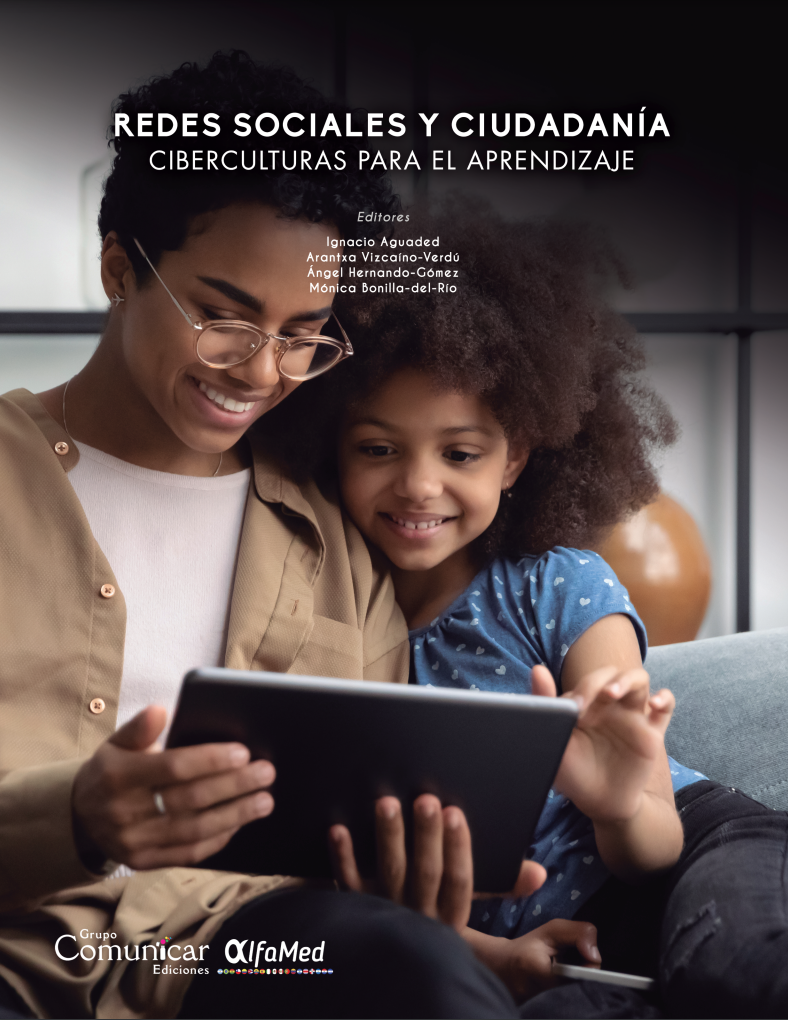
En esta obra participamos mi estimados amigos Octavio Islas y Amaia Arribas, y un servidor, con el siguiente capítulo:
 Loading…
Loading…

